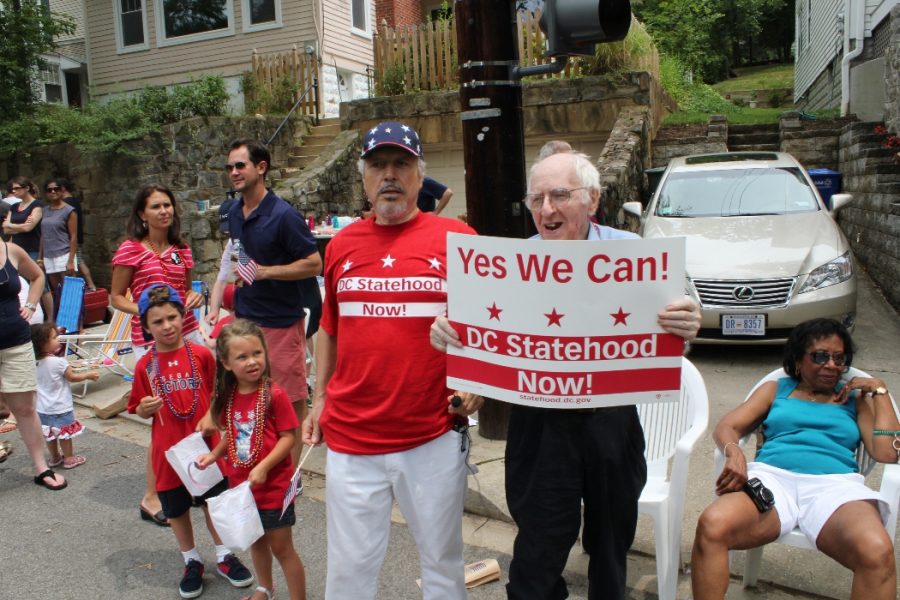Opinion | America has 51 states
Photo courtesy of Ann Loikow/Wikimedia Commons
People advocating for the statehood of Washington D.C. during an Independence Parade on July 4, 2011. Assistant Opinions Editor Talia Duffy argues that the District of Columbia should be considered the 51st state with how much they have contributed to the government.
May 26, 2022
In the 1760s, when British rule dominated the streets of the American colonies, prospective revolutionaries yearned for “no taxation without representation.” It became a rallying cry during the revolutionary war, and eventually, it was cemented into the curriculum of fifth grade history classes across the country.
But each time that phrase is repeated, it is a lie.
Today, there are over 700,000 American citizens who are deprived of representation in Congress. They are the residents of Washington, D.C. They’ve been fighting for statehood for over 200 years — and yes, they still pay taxes. In fact, the district meets nearly every quality and requirement of a U.S. state, but it is deprived of many essential privileges.
In 2020, the district contributed $125.8 trillion to the nation’s GDP. That’s more than 16 states, including Mississippi and West Virginia. But these contributions are not reciprocated; Washington’s status as a federal district means its residents have no control over their own local budget or funding.
This unbalanced relationship extends beyond money. The residents of Washington fulfill the obligations of jury duty and military service like all other Americans, yet they have little power in the federal government.
Get The Daily Illini in your inbox!
As of 1961, Washington residents can vote for president. But they have no senators, and their sole representative, Eleanor Holmes Norton, can hardly be called a representative at all: She has no vote.
Further, any law passed by the Council — Washington’s version of a state legislature — is reviewed by Congress before it is enacted. And with a power that seems like something straight out of a young adult dystopian novel, Congress can choose to absolve Washington’s entire local government on a whim.
This kind of tight control over local government is completely un-American. Washington’s residents must rely on Congress to make decisions for them; they are forced to succumb to federal sovereignty in a way no other American citizen has to.
Most people who are uneducated on the subject balk at the idea of a fifty-first state. “Fifty is a nice number,” they say. Maybe so, but equality is nicer. “Washington is too tiny to be a state,” they say. But actually, it’s not — more people live in the district than in Vermont and Wyoming.
Any real investigation in the matter will result only in confusion as to why the American flag is missing its fifty-first star. And this year, that star was almost added. Almost.
Recently, an act to convert the district into the fifty-first state passed in the House of Representatives. However the vote fell completely along party lines — all in favor were Democrats, and all against were Republicans — so the possibility of the bill making it to the Senate is very unlikely.
So what’s the real reason for this great divide? The answer isn’t that complicated. In fact, it boils down to one of the only constants in American society: racism. Not surprising, right?
If Washington became a state, it would be the only one with a black plurality at 46.31%. To give the district voting power in Congress — especially in the Senate, where party control often teeters on the edge of one or two votes — would be to give over 300,000 Black Americans a voice.
And since Black voters — and Washington residents in general — typically support the Democratic party, Republicans will do everything in their power to stop that from happening, all the while spewing excuses about defending the constitution or respecting the intentions of the Founding Fathers.
In reality, they just can’t stand the thought of losing their occasional hold on the political system. But that’s the thing about voting: You can’t pick and choose who gets to do it. If the 700,000 majority white Republicans in Montana have two senate votes and a real representative, then the 700,000 majority black Democrats in Washington should, too.
Ironically, the Founding Fathers that Republicans so valiantly defend by blocking Washington’s statehood once had something to say on the topic:
“That to secure these rights, Governments are instituted among Men, deriving their just powers from the consent of the governed …”
Without the 51st state, our democratic government does not truly operate with the consent of the governed.
So we can hardly call ourselves a democracy at all.
Talia is a freshman in Media.






